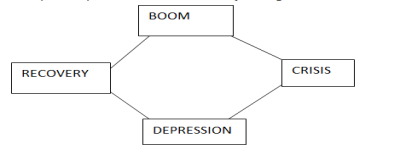TOPIC ONE
CRISES IN THE CAPITALIST SYSTEM
KEY TERMS:
- Allied power: – Included countries such as UK, France, Belgium, Serbia, Montenegro and Russia.
- Central power: – They opposed allied power, they included Germany, Austria Hungary.
- Nationalism: – Belief and loyalty to persons nation.
- Militarism: – This is a policy of aggressive military preparedness.
- Triple alliance: – An alliance of Germany, Austria and Hungary
- Triple Entente :– An alliance of France, Britain and Russia.
- Great Depression: – This was longest economic collapse which occurred in earlier 1940s.
CRISIS:
These are the conflicts and problems, which upset the capitalist production mainly in Europe and in the colonies especially in Africa and Asia.
Term crisis refers to a time of great danger, difficulty or confusion when problems must be solved or important decisions must be made or a time when a problem, a bad situation is at its worst point.
These capitalist crises were
- The First World War or the Great War (WW I)
- The Great Economic Depression
- The Second World War (WW II)
1. The First World War
This was the imperialistic war, which was fought between the two complex military camps namely triple entente, which consisted of France, Britain and Russia (FBR) on one hand against triple alliance, which consisted of Germany, Italy and Austria-Hungary (GIA) on the other hand from Tuesday 28 July 1914 to Monday 11th November in 1918.
The German philosopher Ernst Haeckel first used the term First World War in September 1914. It was generally a global war mostly centered in Europe that began as dated above. It was one of the deadliest conflicts in history paving the way to major political changes including revolutions in many nations involved. The trigger for the war was the assassination of Archduke Franz Ferdinand the heir to the throne of Austria- Hungary and his lovely wife Sophie at Sarajevo, the capital city of Bosnia on Sunday 28th June 1914 by a Serbian member of the terrorist group called the Black Hand Gavrilo Princip
The Trend of The War
- The assassination of Ferdinand setoff diplomatic crisis between Austria-Hungary and Serbia because few days later Austria-Hungary government gave Ultimatum to Serbia to submit the assassin but Serbia refused.
It is historically recorded that on Sunday 28th June 1914 the Austrian Archduke Franz Ferdinand visited the Bosnian Capital City-Sarajevo, a group of six assassins from the nationalist group supplied by the black hand, had gathered on the street where the Archduke’s motorcade would pass. One of the assassins called Cabrinovic threw a grenade at the car but missed. Some nearby were badly injured by the blast, but Franz Ferdinand’s convoy carried on. About an hour later to be exact, when Franz Ferdinand was returning from a visit at the Sarajevo hospital with those wounded in the assassination attempt, the convoy took a wrong turn into the street whereby coincidently Princip stood with a pistol, he shot and killed Franz Ferdinand and his lovely wife Sophie. Following the assassination, the Austria-Hungary suspected the Kingdom of Serbia to have been fully engaged in the assassination of Archduke Franz Ferdinand and his wife. As the result, the Austria-Hungary sent three main ultimatums to Serbia on 23rd July 1914 and the Serbian Government was required to respond to the ultimatum within 48 hours. Serbia was required to
- Offer apologies to Austria-Hungary for the assassination of Archduke Franz Ferdinand and his wife
- Provide detailed information on the assassination of Archduke Franz Ferdinand and his wife to the Austrian authorities
- Allow Austrian officials and judicial institutions to be involved in the investigation of the assassination in Serbia
- Discourage and dismantle all the organizations and publications that were against Austria-Hungary
- Discharge all Serbian officials who committed the assassination
All the conditions were accepted by Serbia, except the demand of allowing Austria-Hungary officials to enter into Serbia’s territory to investigate the crime stating that this would be a violation of the Constitution and of the law of criminal procedure. Three days later, on July 28, 1914, Austria-Hungary declared war on Serbia, beginning the First World War. On 28th July 1914, Austria-Hungary invaded Bosnia.
On 2nd August Germany invaded Belgium and Luxemburg and on 3rd August 1914 Germany declared war against France in the fear that France would help Russia.
On 4th August Britain declared war against Germany.
The USA joined the war on 6th April 1917 to assist the members of the Triple Entente
The war ended on 11th November 1918 in which Germany was defeated by victorious powers.
The Causes of The Ww1
The causes of the WW I can be categorized into two groups, namely short term and long term causes.
The Long Term Causes
These were the causes, which prepared the grounds for the outbreak of the war. They are in other words called the underlying causes. These factors are as follow.
- The development of capitalism into the highest stage in 1860’s: This created a stiff competition amongst capitalist powers such as Germany, France, Britain, Italy and Austria Hungary. For example, Germany fought a war with France over the issue of Alsace and Loraine rich region in coal in Franco-Prussian war of 1870-1871. This contributed to the formation of Alliances hence the war.
- Dissatisfaction in territorial division: The partition of colonies in the Berlin conference of 1884 to1885 was not fair because some European countries such as Italy was given few colonies compared to other European countries. This created hatred amongst the super powers thus creating grounds for the war.
- The rise of military alliances: Germany sought alliance with Austria and signed the Dual Alliance in 1879 with the condition that they have to help each other during the war. Italy joined in 1882 to form Triple Alliance. On the other hand, France-Russia treaty was signed 1890 to form Entente Cordially and Britain joined later to form Triple Entente (agreement). The rival alliances created weapons such as bombs, guns, tanks, and created armies, which were ready for the war at any time. Furthermore, the alliances created the fertile ground for the outbreak of the First World War in 1914
- 4. The France desire to regain Alsace and Loraine (the French Revenge movement): Germany annexed the two provinces of Alsace and Lorraine during the Franco-Prussian war of 1870-1871. This created grounds for the revenge amongst the French men hence preparing the ground for WW I
- The Balkan crisis (Balkan nationalism): The Balkan nationalism created conflicts between Austria-Hungary against Serbia and between Austria-Hungary against Russia. The competition amongst the three powers led to the assassination of Franz Ferdinand hence the WW1.
- Moroccan Crisis 1905 and 1911: The conflict was between France against Germany in which Germany declared independence to Morocco, which was the French colony. This created the hostility between France against Germany something, which prepared the ground for the outbreak of the WWI.
- Arms race and militarism contributed greatly to the outbreak of the First World War simply because, European powers especially Great Britain and Germany competed in the production of arms and enlargement of soldiers. Good example is Germany who increased her armies from 400,000 to 800,000 the same Britain increased it drastically, such competition made other powers to increase their military budget for defense, also it caused to the antagonistic relations among European powers.
The Short Term Cause (The Immediate Cause)
The immediate cause for the outbreak of the WW I was the assassination of Archduke Franz Ferdinand and his wife Sophie on 28thJune 1914 in Sarajevo the capital city of Bosnia. Archduke was the Austrian Prince and the heir to throne. As he pay a visit in Serbia with his wife, they were shoot dead by a Serbia young boy called Gavillo Princip, this made Austria Hungary government to give ultimatum (a statement of terms that must be accepted) the ultimatum had three conditions, these were: -
Serbian to explain for the assassination and bring / surrender the assassins, second Serbia to dismiss all officials suspected and lastly Serbia to allow Austria – Hungary’s soldiers to make investigation. As Serbia responded negative, this caused for the outbreak of the war. (For more information please read this article).
Generally the outbreak of the First World War was the contributing factors to the underdevelopment of African continent in a sense that European powers being economically affected they embarked on massive exploitation by increasing more taxes, alienating African fertile land and many other related chaos.
The Impacts of The First World War On Africa
- All German colonies such as Tanganyika, Burundi, Rwanda, Namibia, Togo and Cameroon were put under League of Nations as mandatory territories. This led to the changing of colonial administrative systems, which affected Africans. This was done following the Versailles Peace Treaty in Paris France in 1919
- Deaths amongst Africans especially in Germany colonies such as Tanganyika and Togo because Germany recruited African soldiers to fight on its side.
- The spread of disease such as flu, which hit the lives of thousands of Africans for Example in Tanganyika it is approximated about 7000 people, died because of flue.
- Destruction of properties such as farms, mines and physical infrastructures like railways were badly destroyed in German colonies.
- The fall of the external trade between Europe and Tanganyika due to the destruction of European economies such as banks and industries.
- There was increasing exploitation in the colonies such as land alienation, low wages and introduction of agricultural schemes in order to compensate the losses, which had occurred following the war
- Fall in the prices of raw materials from African colonies because of the severe financial crisis that had hit the countries, which participated in the First World War
- It led to the introduction and development of forced colonial agricultural schemes in order to generate big qualities and quantities of raw materials geared towards restructuring the economies of the western capitalist countries, which took part in the war
- The First World War led to the reduction in the colonial expenditures in the African colonies due to the effects of the war
The Great Economic Depression 1929- 1933
The Great Depression was the deepest and longest-lasting economic downturn (slump) in the history of the Western industrialized world. In the United States, the Great Depression began soon after the stock market crash on Tuesday 29thOctober in 1929, the day came to be known as the Black Tuesday, which sent Wall Street into a panic and wiped out millions of investors. Over the next several years, consumer spending and investment dropped, causing steep declines in industrial output and rising levels of unemployment as failing companies laid off workers. By 1933, when the Great Depression reached its nadir (the worst moment of a particular situation), some 13 to 15 million Americans were unemployed and nearly half of the country’s banks had failed.
It is historically recorded that the depression started in the US and spread to other parts of the world. Before the depression, the US economy was very stable and it was the leading manufacturing country in the world. For instance, when the US manufactured 4.5 million cars, Germany, Britain and France together produced a total of 500,000 cars. This is because while other powers were fighting in the WWI, the US was improving its technology, which had great impact on its industrial economy.
However, in the same year, the stock exchange market of the US collapsed because all its shares (stock) lost value and people who tried to sell their shares suffered losses as the price of shares went down due to the depression of the economy. This situation marked the beginning of the world economic crisis and it was termed The Great Economic Depression.
Characteristics of Great Economic Depression
- Fall in agricultural and industrial production.
- Low prices of crops and goods such as in the US the price of wheat declined.
- Closure of banks in capitalist world for example in the US 5,000 banks were closed by 1932.
- Unemployment in the world for example over 30 million people had no jobs in US by 1932.
- Collapse (decrease in) the national income.
- Low wages and salaries, food shortage and poor social services.
- Starvation and loss of many lives
Capitalist Production Cycle
The capitalist production has four major stages.
Boom Stage (Peak)
This is the period when the economy is at the highest level. During this period, the economy has the following characteristics/features:
- High level of investment
- Lowest level of unemployment
- High standard of living
- Social and political stability
- Expansion of trade.
Crisis
This is the temporary decline in the economic activities and it has the following challenges
- Decrease in investment
- Decrease in employment
- Decrease in income
- Decrease in trade
- Decrease in commodity price
Depression Stage
This is the period of total decline in the economy or stagnation of the economy. It has the following characteristics;
- Lowest level of investment.
- Highest level of unemployment.
- Lowest standards of living
- Total closure of enterprises and investment
- Lowest level of income.
Recovery Stage
This is the period when the economy starts to improve and expand, it follows after a depression or a recession; it has the following characteristics;
- Income starts increasing
- Prices start to rise.
- Standard of living starts to rise.
- Opening of Banks.
- Investments start to expand.
The Causes of The Great Economic Depression
- The effects of the WW1: The war ruined the economies of almost all European countries. Due to the collapse of economies, efforts were made to recover economies by producing as much as possible. This created over production of merchandise (goods) against under consumption hence, Great Economic Depression. Furthermore, the WW I destroyed the important economic infrastructures such as roads, railways and so on
- High Protective tariffs by the US on the imported goods from Europe. This appealed European country to put tariffs on the US goods as a result market was narrowed to both continents hence over-production and great economic depression.
- Un-equal distribution of income: The difference in incomes between capitalist and workers in which workers were paid inversely proportional to what they produced created a gap between production and consumption hence depression.
- The collapse of the US stock exchange market: This was the immediate cause of the Great Economic Depression, the New York Stock collapsed on 29th October in 1929, the stock was located along the WALL STREET, due to the public rumors that the boom was about the late and many people were rushing to withdraw their money from banks and sell their shares at lower prices than before. The values of the shares fell drastically between September and December in 1929. The collapse of the New York Stock exchange market led to the collapse of business and agriculture due to lack of capital
- The failure of speculators to pay back loans borrowed from banks: Speculators are people who trade commodities, bonds, equities and currencies, the failure to repay the loan affected economy hence great depression.
- Nature of the capitalist economy: Economists believe that depression was inevitable because any capitalist economy has to pass four phases, which are cyclic. Boom, Crisis, Depression and Recovery. Therefore, its nature is what driven it to depression.
Failure of the banking system and bad debts especially the housing banks
Effects of The Great Economic Depression Africa
- Drastic fall of the prices of raw materials in the African countries; for example, the price of sisal exported to Europe dropped from 32 pounds per ton to 12 pounds per ton between 1931 to 1932.
- Fall in worker’s wages; Colonial government reduced the salaries and wages of workers for example in Kenya the worker’s wages fell from 36/=Kshs to 10/= Kshs in 1930.
- Unemployment; the depression caused unemployment in many African countries because the colonial government retrenched (reduced) some workers and reduced the size of army.
- The introduction of agricultural schemes; such as groundnuts schemes in Gambia and Tanganyika.
- Intensification of exploitation; post-depression period witnessed the increase of tax, reduction of worker’s wages, forced labor, low price of cash crops and long working hours which were introduced by the colonialists so as to compensate their economies.
- Intensive exploitation. Colonial governments in Africa increased exploitation of African resources. Example land alienation was doubled, new taxes were introduced, forced labor and low wages, and this aimed at compensating the financial crisis that had affected their economy.
- Africans were discouraged by the colonial government to grow their subsistence crops such as millet, sorghum, cassava, yams and maize, instead; they were forced to grow cash crops on their farms so as to increase the production of raw materials, which were highly demanded in Europe at that time.
- Decline in provision of social services. Great depression led to the decline of provision of social services in Africa whereby the colonial government was no longer interested in the investment of social services because of severe financial crisis in Europe.
- Establishment of processing industries. The establishment of processing industries likes cotton ginneries, oil refinery as to increase the qualitative and quantitative output in the metropolitan countries.
- Regional imbalance. Great depression contributed to the regional imbalance of transport network whereby railway lines and roads were constructed in areas where production was high and in places that there was no transport network.
Measures Taken By The Colonial Powers To Alleviate The Impact of The Great Depression In The Colonies
Several measures were taken by the colonial powers to revamp the impact of the great depression on the metropolitan economies. This includes the following;
- Introduction and expansion in consolidating the peasant cooperative societies e.g. in 1932 the KNCU was formed, the Kagera coffee growers and many others with the aim to improve the production of cash crops.
- They initiated more campaign in most African colonies by establishing more plantations and forced cropping e.g. in Tanganyika all able bodied men were supposed to work on plantations for 12 hours a day and all shops of wine (pombe) were supposed to be closed during the day and open in the evening. Some of these development schemes introduced were like Ulugulu land usage scheme Mialo rehabilitation scheme Usukuma and Mbulu destocking.
- They allowing peasants in settlers economy like Kenya and Zimbabwe to cultivate the prohibited cash crops that had been preserved for the settlers like tea, coffee, cotton, etc this was aimed at increasing the quantity of cash crop production as to fill the gap in the metro pole economies.
- They changed African education syllabus and curriculum as to respond with the need of the metropolitan, emphasis was put on handcraft agriculture, and vocational schools as to increase production and exploit African cheap labor as a solution to solve the great slump
- The colonial government begun to intervene in agriculture sector by providing subsidies, the settlers classify peasant, farmers, and provide them farming implements like hybrid seeds, fertilizers and packaging, to increase the quality and the quantity of the production.
- The colonial government also begun to develop transport network like railway, harbors ,ports, so as to ease the transportation of the highly needed raw materials in the metro pole.
- In addition, the colonial government increased the activities in mining of gold diamond, copper, and exploitation of African cheap labor e.g. in Kenya the Kipande system was increased from 80 days to 160 per person annually.
- They intensified labor recruiting bureaus was set to encourage and recruit migrate labor for stance SILABU in Tanganyika, railways were asset to transport labor force from labor reserves to plantations.
- New taxation were introduced in the colonial state to increase colonial revenues as well as to encourage cheap labor of the Africans new taxes introduced included Hut tax poll tax, livestock tax among others.
The Second World War
The Second World War was nothing but the continuation of the First World War. It is considered to be the deadliest war that the world had never experienced because sophiscated and deadly weapons such as nuclear weapons, airplanes, tanks and so forth were used. It is historically recorded that the war began on Friday 1st of September in 1939 and ended in 1945. It was fought between the Axis powers, which consisted of Germany, Italy and Japan against the Allied powers or the democratic powers namely Britain, the USSR, the USA and France.
The war in Europe ended with an invasion of Germany by the Western Allies and the Soviet Union culminating in the capture of Berlin by Soviet and Polish troops and the subsequent Germany unconditionally surrendered on 8th May 1945. Following the Potsdam Declaration by the Allies on 26 July 1945 and the refusal of Japan to surrender under its terms, the United States dropped atomic bombs on the Japanese cities of Hiroshima and Nagasaki on 6 August and 9 August respectively. With an invasion of the Japanese archipelago imminent, the possibility of additional atomic bombings, and the Soviet Unions declaration of war on Japan and invasion of Manchuria, Japan surrendered on 15 August 1945. Thus ended the war in Asia, cementing the total victory of the Allies
- Failure of the League of Nations to keep the world peace.
Primarily, the League of Nations was established to assess the impact of the First World War in 1919. Its Main function was to keep the world peace and security. Yet it failed to prevent armament and militarism of the aggressive powers such as Germany and Italy. Some of the reasons, which made it failed in the maintenance of the world peace, are summarized as follows.
- It had no army of its own, which could interfere aggressive powers such as Germany and Italy.
- It had no clear charter towards maintenance of the world peace.
- It did not exercise or implement the terms or resolutions which were reached at the Versailles peace Treaty Summit which was held in February in Paris France.
- Many scholars argue that the League of Nations had no teeth (power) to intervene any aggressive power.
- Many Nations withdrew from the League and started forming their own Military wings such as Axis powers as a result; these nations violated the terms and instructions from the League. Ultimately, the failure of the League of Nations to disarm and maintain the world peace led to the outbreak of the Second World War
- The rise of dictatorship governments in Europe. Fascism in Italy under Dictator Benito Mussolini in 1922 and Nazism in Germany Under dictator Adolf Von Hitler in 1933. These dictatorial regimes went in hand with production of massive and destructive weapons which created aggression, tension and hatred amongst the world powers for instance after the rise of Nazism in Germany, Adolf Hitter started the Anti-Jews campaigns which aimed at Killing of all Jews who were living in Germany. This move was historically referred to as HOLOCAUST
NB: Fascism originates from an Italian word “Fasces” Which means bundles of rods and forces symbolizing unity and force Nazism implied extreme totalitarianism policy, which was based on expansionism, militarism dictatorial, and nationalism policy by Adolf Hitler.
- Italo-Ethiopian war of 1935 (Abyssinia Crisis of 1935) This crisis came following the Italians’ attack against Ethiopian in Africa. The war is referred to as Italo-Ethiopian crisis whereby Italo means Italy in other words; it is referred to as Abyssinia crisis for by then, Ethiopia was known as Abyssinia. Italy under Benito Mussolini had expansionism policy of acquiring areas of influence that is why she attacked Abyssinia. The Conflict raised much attention in the world as a result; the Allied powers such as Britain, USSR and US developed hostility condemning Benito’s decision of attacking Ethiopia. This move prepared the ground for the outbreak of the Second World War (WWII) in 1939.
- The effects of the Great economic depression of 1929 – 1933 contributed to the outbreak of the Second World War. This is due to the fact that, during that period, many European civilians had experienced much sufferings coupled with unemployment, low investment, poor living standards (poverty in general) Thus some leaders like Adolf Hitler and Benito Mussolini took the advantage of the situation to get into power during their campaigns, they promised their citizens bread and honey but once they won the elections they did not fulfill the promises rather they embarked on militarism and armament which led to the rise of dictatorship regimes hence the outbreak of the war. Thus, they took the advantage of the crisis as the stepping-stone into power.
- Spanish civil war in 1936 – 1939 it was the war, which was sparked of by rebels against the democratic government. During this, Adolf Hitler tried out his new weapons on the side of the right wing military rebels in the war. He joined Benito Mussolini who was also supporting the revolts something, which brought the two. Hitler and Benito together this move Created hostility against Allied (B.U.U F) powers, something, which prepared the ground for the outbreak of the Second World War.
- Attack of Poland by Germany (Invasion of Poland). This was the immediate cause for the outbreak of the Second World War. On1st September in 1939, 11:00am. Germany troops entered Poland. Following this aggressive action by Germany, Britain and France asked Adolf Hitler to withdraw his troops from Poland immediately but Adolf Hitler gave them a deaf ear that is he did not respond to, following Germany’s refusal, Britain declared war against Germany on the very same day France declared war against Germany something which led to the outbreak of the Second World War.
- Failure of the appeasement policy this was the policy which was firstly introduced by the British Prime Minister Chamberlain, in order to avoid the outbreak of the second world war. Chamberlain initiated this policy on Adolf Hitler as one of the ways of keeping him happy by giving him loans, pardoning Germany debts. At the end of the day, the policy did not materialize simply because Germany under Adolf Hitler went on with militarism and/ or armament, which prepared the fertile grounds for the outbreak of the Second World War.
- Japanese attack on Pearl Harbor, while Germany invaded the Soviet Union, Japan made a surprise attack on 7th December 1941 on the US navy base at Pearl Harbor. This forced the US to support Britain and the USSR in fighting against the Germans with their leader Hitler and his allies namely Italy and Japan.
Effects of The Second World War
General Effects
- Depopulation was one of the effects of the Second World War in Europe and elsewhere. This was due to the deaths amongst soldiers and civilians following the use of the most deadly weapons such as atomic bombs, for example on Monday 6thAugust in 1945 the city of Hiroshima and atomic bomb was dropped by the allied powers. Also on Thursday 9th August 1945 in the city of Nagasaki another atomic bomb was dropped which was basically more destructive than that of Hiroshima. The bombings claimed lives of many civilians.
- It led to the establishment of the United Nations Organization on 24th October in 1945, which marked the end of the League of Nations of 1919. This Organization was established in order to keep the world peace so much that the third world war does not occur.
- WW II led to the beginning of the cold war following the emergence of the two super power nations in the world namely the USA (United States of America) and the USSR (Union of Soviet Socialist Republics) in 1945
- In this, the USA became the leading capitalist super power nation in the world whereas the USSR became the leading socialistic power in the world something, which led to the emergence of the cold war between the two, blocks.
NB: Cold war refers to as the ideological war, which emerged between the USSR against the USA soon after WW II in 1945. In cold war, the parties do not enter into active warfare but they do not cooperate, there exists mistrust between them.
- WW II led to the rise of massive nationalism in the world especially in Africa. Following the roles played by ex-soldiers who fought during the war and Pan- Africanism movement in the world, African, Asian and Latin America countries started fighting for their independence, the ex-soldiers or returned soldiers formed different political parties and associations, which aimed at liberating their countries.
- The Second World War led to division of Germany into two antagonistic parties namely Eastern Germany, which was following the socialistic, ideology, and Western Germany, which was following the capitalist ideology. This situation led to the construction of the Berlin wall, which separated the two parties.
- The war led to fall of production activities for countries were not settled to engage in production activities. Additionally, some key economic sectors such industrial sectors were badly destructed by the war.
- The war led to lack of peace and security in the world in general
- It led to social sufferings and outbreak of communicable diseases such as cholera due to lack of sanitary condition. Other social miseries included famine among people, which coupled with lack of food security.
Effects of The Second World War (WW II) On Africa
Despite the fact that the Second World War was not fought in Africa. Africa was both negatively and positively either directly or indirectly affected by the Second World War (WW II)
- Depopulation in Africa. This is because many soldiers who fought in the Second World War on the side of Britain and allied powers in general were recruited from African colonies; strong energetic men are taken away. Besides a good number of them died during the war something which led to depopulation in Africa.
- The Second World War led to the rise of mass nationalism in Africa, following the role played by the ex-soldiers or returned soldiers who survived the war. They had fought for their colonial masters and that when they returned back home (Africa) they formed different nationalistic political parties which raised people’s awareness about the evils of colonialism, for example Dedan Kimath and General China were ex-soldiers from the WW II who led the struggle for independence in Kenya.
- The second world war led to intensive colonial exploitation in Africa, which went along with forced labor, land alienation, low wages and heavy taxation on Africans. The exploitation meant to generate raw -materials so much that they could restructure their economies which were badly destroyed during the second world war.
- It led to lack of peace and security in Africa: for Africans could no longer settle and indulge (engage) in production activities due to fear and unrest in the continent.
- The war led to separation of families, which was coupled with extreme social sufferings amongst Africans. Separation of families occurred following recruitment of soldiers from Africa who were taken to fight in the war leaving their families behind.
- The Second World War led to establishment of import substitution industries (ISI) in Africa in order to reduce cost of importing goods from their mother countries, which could easily be manufactured in Africa. Consumables such as cigarettes, beverages, butter, chocolate, meat and so forth were by then produced in Africa; the aim behind was to reduce expenditure on importation of goods from abroad.
- The formation of the United Nations Organization (UNO) on 24th October 1945 two months after the second world war was a blessing to African states because UNO supported many African states to fight for their freedom that is why many independent African states joined the UNO.
- Socialism Ideology started to spread in African states following the USSR influence on Africa for example the United Republic of Tanzania adopted socialism and self-reliance ideology in 1967.
- The Second World War led to grow more cash crops campaigns in African colonies for example the colonialists introduced different agricultural schemes such as Sukuma cotton agricultural scheme, Nachingwea groundnuts scheme and so on. These campaigns went hand in hand with the establishment of master farms in rural areas. The schemes meant to get money from the colonies in order to restructure their economies which were badly destroyed by the second world war (1939-1945).
www.learninghubtz.co.tz
END OF TOPIC QUESTIONS.
1. MULTIPLE CHOICES
(i) Second World War broke out in
- 1933
- 1918
- 1945
- 1939
(ii) Central powers included countries such as
- Germany, Britain, Italy
- Germany, Austria - Hungary
- Russia, U.K, Serbia
- U.K, France, Belgium, Serbia.
(iii) Which of the following was not a cause of First World War?
- Nationalism
- Economic imperialist
- Militarism
- Over empowerment of Germany.
(iv) First World War broke out in
- August 1914
- June 1914
- July 1914
- May 1914
(v) The member of Triple entente were
- U.S.A, Russia, Italy
- Britain, Russia, France
- Germany, Italy, Belgium
- Austria, Hungary, Germany
(vi) Which of the following was not an impact of Second World War in Europe?
- Killing ad destruction of African families
- Death of millions of white solders
- Led to economic depression
- Collapse of old empires and creation of new ones.
(vii) Which of the following was not a cause of great depression?
- World War I
- Mass unemployment
- Unequal distribution of wealth and income
- Poor banking structure
(viii) The axis powers who participated in WWII included
- Britain, U.S. Soviet Union
- Germany, Italy, Japan
- Britain, Japan, U.S
- Germany, Belgium, Netherland.
(ix) The Second World War broke out on
- 1933
- 1936
- 1945
- 1939
(x) Which event marked end of WWII
- Collapse of Italy
- Occupation of Germany
- Bombing of Nagasaki and Hiroshima
- Joining of USSR to the war.
2. Match the items.
| LIST A | LIST B |
|
|
SECTION B:
3. Discuss impact of WWII in Africa
4. What were caused of Great depression?
5. Describe the immediate causes of WWI
6. How did Great depression affect America?
SECTION C:
7. Explain how Africa participated in WWI
8. Describe factors that led to WWII
Hub App
 For Call,Sms&WhatsApp: 255769929722 / 255754805256
For Call,Sms&WhatsApp: 255769929722 / 255754805256
 For Call,Sms&WhatsApp: 255769929722 / 255754805256
For Call,Sms&WhatsApp: 255769929722 / 255754805256
WHATSAPP US NOW FOR ANY QUERY
App Ya Learning Hub Tanzania







